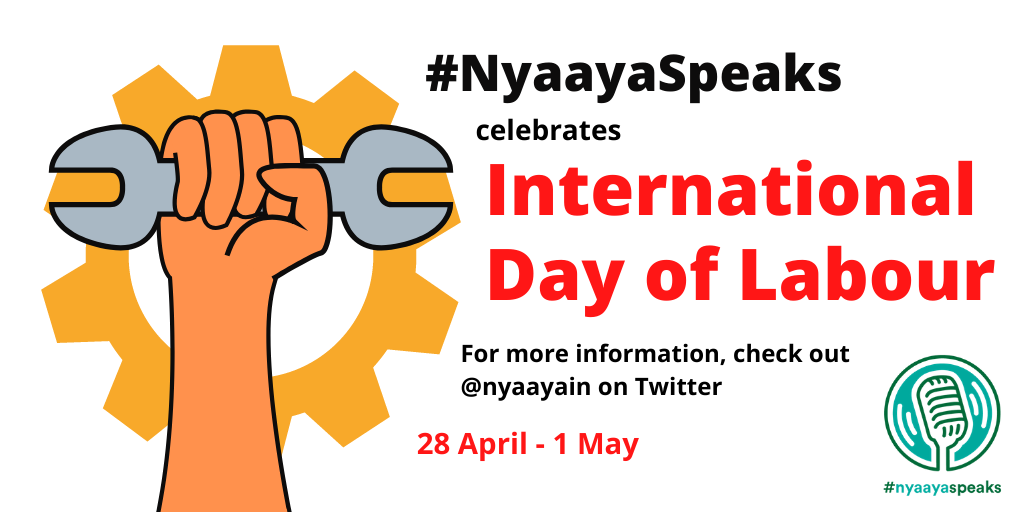

Workers all around the world celebrate May 1 as the International Day of Labour. It is seen as a tribute to all the efforts of labourers and activists who worked towards creating a fair, just and safe work environment for everyone, everywhere.
But what do we know about this holiday? How did May 1st come to be Labour Day? When was the first labour day ever celebrated? How does India celebrate this holiday? And most importantly, does India follow the spirit of labour day and provide adequate protections to our workers?
History of Labour Day
The origin story of Labour Day dates back to 1886 in Haymarket Square, Chicago.
On May 3, a general strike protesting for an eight-hour workday had ended in police brutality against the strikers killing one person and severely injuring many others. To protest this police brutality, a mass meeting was called for in the Haymarket Square. The then Mayor of Chicago, Carter Harrison, had also attended this meeting as an observer. After the mayor left, the police arrived to disperse the crowd.
While the police were attempting to clear out the meeting, a bomb was thrown by an unidentified individual, to which the police responded with random gunfire. Amongst the civilians, about 4 to 8 people died and 30–40 were estimated to be injured. Seven police officers were also killed and about 60 injured.
To commemorate this tragedy, in 1889, an international federation of socialist groups dedicated May 1st as Labour Day. While this holiday came to be recognised with many other names such as Workers Day or International Workers Day, in essence, it became a tribute to workers and their struggles, everywhere.
Labour Day Celebrations in India
In India, the first labour day was first celebrated in 1923 in Chennai (erstwhile Madras) by the Labour Kisan Party of India. May 1st also happened to be the party’s founding day under the leadership of Singaravelu Chettiar.
Labour Day, also known as May Day, was celebrated in two locations in Chennai- one at the beach opposite Madras High Court and the other at Triplicane Beach. Monuments of the day can still be found in several parts of Chennai.
Interestingly, it was also a day where the red flag was first waived in India to mark allegiance with the international labour movement. As for more recent celebrations, though not recognised as a national holiday in the country, May 1st is still observed by several groups in honour of workers everywhere.
Laws for Protecting India’s Workers
In India, the development of labour regulations began in the pre-independence period. A cursory review of these legislations reveals a pattern of development of these laws through different stages.
The first wave of policies was a response to the agitation of factory and mill workers demanding better working conditions, basic levels of protection, fair wages, etc. These policies were seen to be very sporadic and only introduced as a knee jerk reaction to agitation to either created by strikes or specific incidents.
The second wave of regulations was a bit more organised with demands for unionising and collective actions on account of mobilisation efforts of activists and trade union leaders. Some examples of the second wave are the Indian Trade Unions Act, 1926 and the Trade Union Disputes Act, 1929. The third wave of legislations came into force after Indian independence to give effect to the Constitutional provisions.
Now, we have about 160 separate labour laws at the Centre and State levels governing different aspects of labour and work in India, that aims to cover both organised and unorganised sectors. Prima facie, they may seem very scattered, but these legislations cumulatively provide a wide range of protection to workers in India.
These developments in labour policies are largely seen as a direct result of the efforts of several labour and trade union activists like Dr BR Ambedkar, VV Giri, NM Lokhande, etc.
#NyaayaSpeaks on Labour Day
We at Nyaaya, are dedicating our next #NyaayaSpeaks series to International Labour Day to celebrate and spread awareness about labour laws and protections available to all kinds of workers in India.
Beginning April 28th, i.e. the International Day of Health and Safety at Work, to May 1st, we will be sharing with you various posts, articles, tweets on this subject with the aim to empower workers.
We will also be sharing with you stories of unsung heroes from India’s history who contributed to the development of this sector and brought about several reforms that prove to be helpful even today.
Tune into all our socials and look for the hashtag #NyaayaSpeaks for our special posts on labour day.
Shonottra Kumar is a Research Fellow at Nyaaya, an initiative of Vidhi Centre for Legal Policy.


